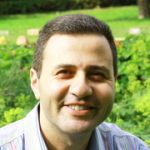Abstract
In symbiotic associations, there is a constant molecular complexity that allows for the establishment and maintenance of such ecological relationship. Metabolomic profiles have enabled us to explain symbiotic associations in terms of their underlying molecules and interactions between the symbiotic partners. Here, we define metabolomics as ‘‘a systematic analysis of metabolite structures, concentrations, pathways and fluxes, and molecular interactions within and among organisms as a function of the environment’’. This talk provides an overview of metabolomics and discusses its complementary role within system biology of three different symbiotic relationships in plants, marine soft corals and lastly human gut microbiota. In plants, we present a procedure for a metabolome-based volatiles profiling approach in soil bacteria termed PGPR for the identification of bioactive agents that could be directly applied as biocontrol agents. Results presented shall illustrate how interestingly can volatiles analyses in PGPR lead to valuable information relative to PGPR beneficial effect in planta that could ultimately lead to their better field exploitation. Coral reef biologists have attributed much of the increase in coral mortality to coral bleaching subsequent to elevated seawater temperatures concurrent with a release of the algal endosymbont living inside corals. Metabolomics was applied for the first time in corals to assess the metabolic response of individual partners and how each host/symbiont system responds separately to environmental stress. A unique change in natural products patterns of each partner was observed in response to a variety of environmental stimuli. These marker metabolites may act as stress indicators, which reflect the metabolic processes tuned during such stress events. Lastly, a scenario as to how gut microbiota interact with different dietary food using in vitro culture and the outcome on human health is presented for the first time using metabolomics.
Biography
Mohamed A. Farag, Ph.D.
TWAS Fellow in Agriculture,
Alexander von Humboldt fellow
Professor, Faculty of Pharmacy, Cairo, Egypt
Editor in Chief Journal of Advanced Research, efoods
Associate editor; Food frontiers, foods, Peer J
Guest editor Food Chemistry
Prof. Farag is a full professor at Cairo University, his home institute where he has established the first natural products metabolomics lab in Africa for applications in foods and functional foods, and to publish a prolific number of papers in high quality journals with close to 10,000 citations for a total of 380 publications. Specializing in metabolomics, natural products chemistry, and plant biochemistry, Mohamed A. Farag completed his PhD at Texas Tech University, USA, in 2003. In 2005, after spending time as a postdoctoral fellow at The Samuel Noble Foundation, USA, and the James Graham Brown Cancer Center, USA, he became assistant professor in 2005 at the Faculty of Pharmacy, Cairo University, Egypt.
Since 2009, Dr. Farag has been working as a part time visiting professor at the Technical University of Munich, Germany, to participate in teaching plant metabolomics and chemomterics modelling for master students, and in 2009–2010 he held the Alexander von Humboldt fellowship at the Leibniz Institute for Plant Biochemistry, Germany. Dr. Farag now works full time as a professor at the Pharmacognosy Department within the Faculty of Pharmacy, Cairo University, where his research work focuses primarily on applying innovative biochemical technologies (metabolomics) to help answer complex biological questions in medicine, herbal drug analysis, and agriculture. Dr. Farag has also recently developed the first metabolomics platform for volatiles profiling in microbes along with colleagues in Louis Pasteur Institute pertaining bacterial volatile’s role in plant protection, infection progression and microbial resistance. Dr. Farag was selected as a top researcher in the field of plant biology in Africa by the American society of plant biology, USA. Dr. Farag is a current TWAS fellow in Agriculture from Egypt.
https://www.researchgate.net/profile/Mohamed_Farag6
Interests: nutraceuticals; metabolomics; natural products; quality, control; drug discovery
https://uni-bremen.zoom.us/j/97667626188?pwd=U093anJYZzlNM3Nyc2hrbnZVT09DZz09
Meeting ID: 976 6762 6188
call to:976 6762 6188
Passcode: Zoominar





